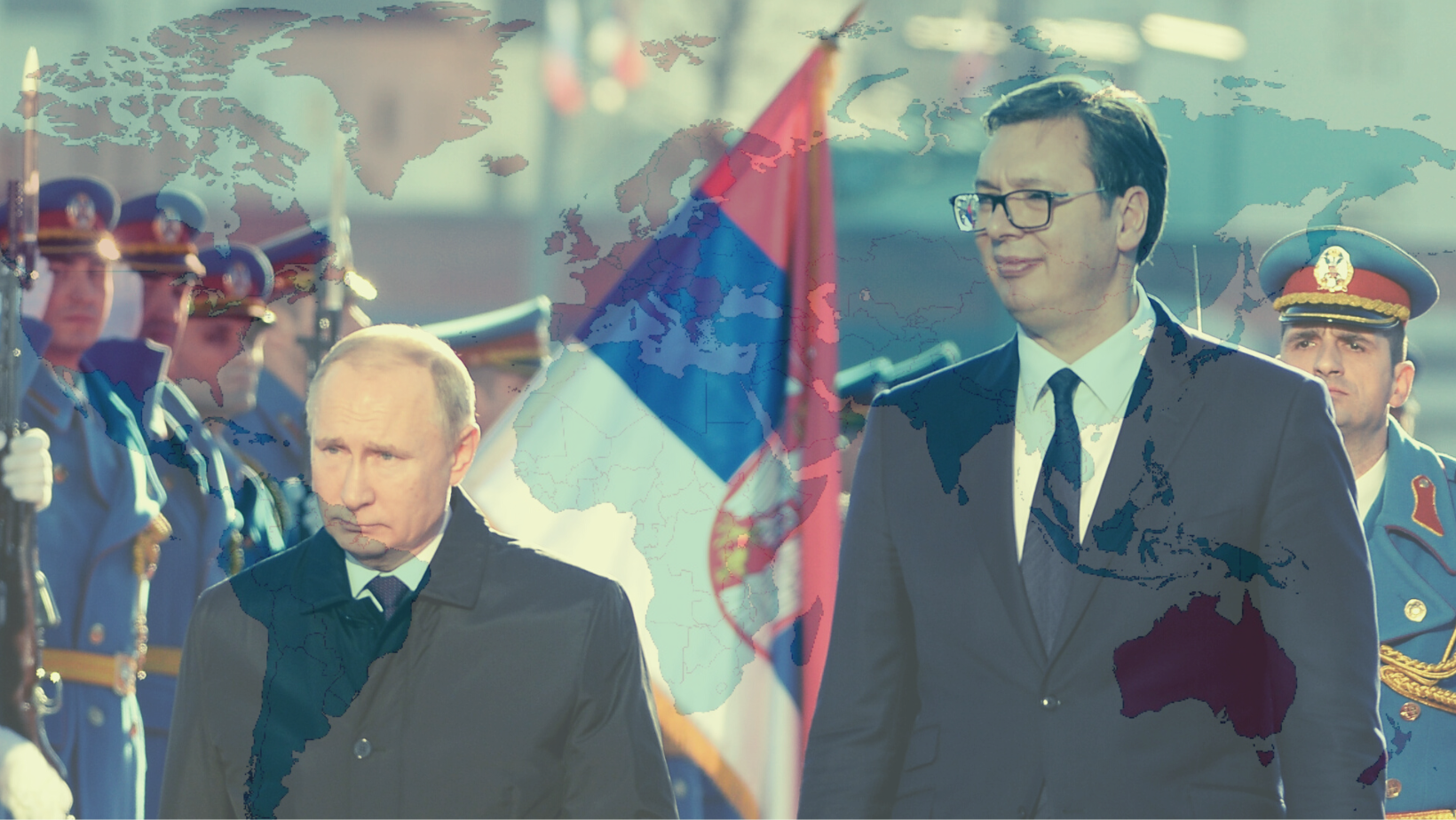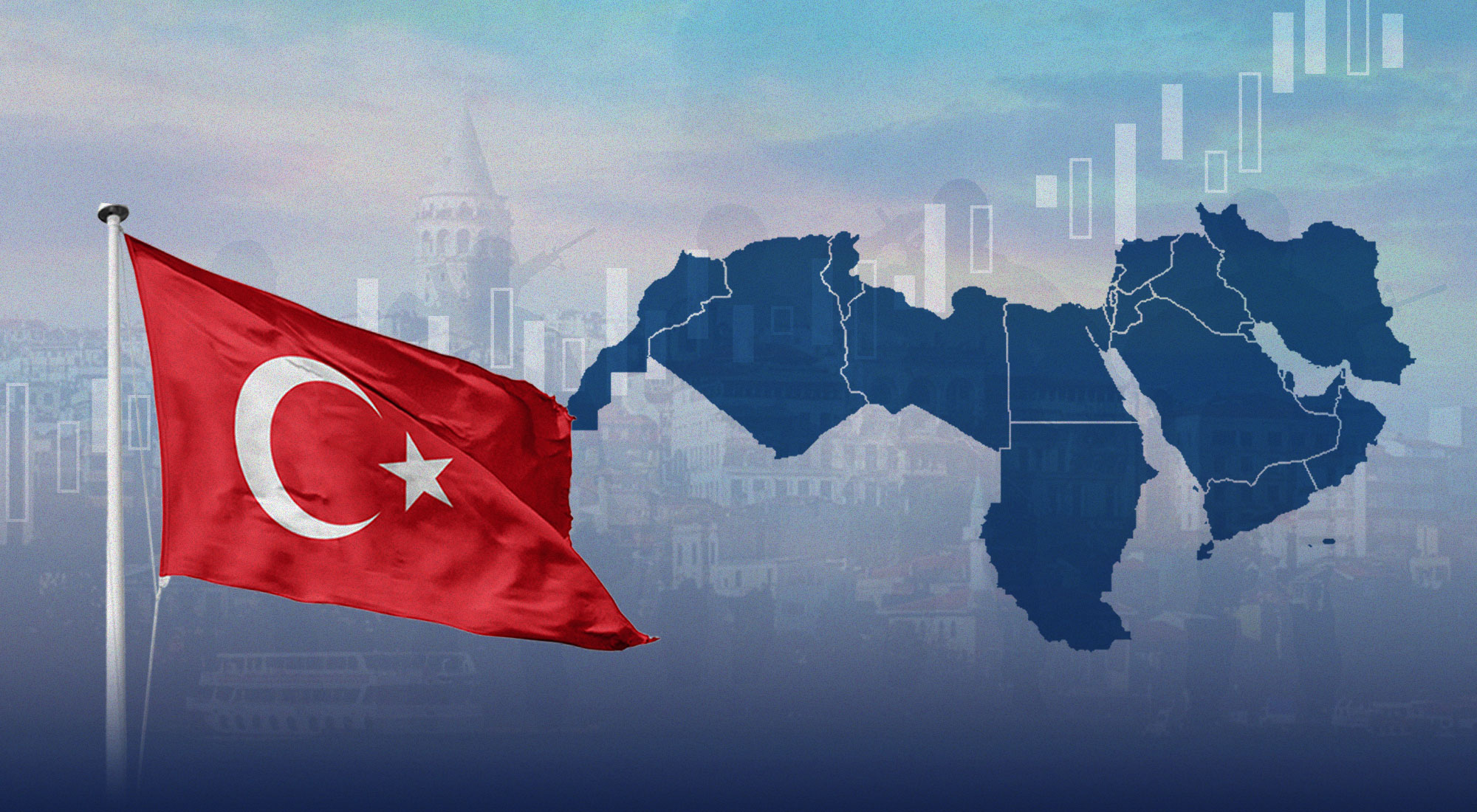The Russian-Ukrainian war leaves Serbia facing difficult geopolitical dilemmas. Still officially a European Union (EU) candidate, the bloc’s members, especially Germany, are Serbia’s top trade and investment partners.[1] At the same time, no European country, except for Belarus, has been as pro-Russian as Serbia. Public opinion, a shared Slavic Orthodox identity, the Kosovo file, and Serbia’s dependence on Russian gas all contribute to the value which Belgrade places on its “special relationship” with Moscow.
Today, East-West bifurcation is increasing while space in Europe for neutrality shrinks amid a rapidly evolving security architecture. Serbia’s policies vis-à-vis the Russian-Ukrainian conflict are heightening tensions in Belgrade’s relationships with other European capitals and Washington. Put simply, Serbia, which analysts have labeled the Kremlin’s “proxy” state in the Balkans, constitutes a worsening headache for the EU and the North Atlantic Treaty Organization (NATO).[2] Important questions remain open about Serbia’s geopolitical position in Europe as the Russian-Ukrainian war rages on and risks spreading elsewhere, such as Moldova.[3]
President Aleksandar Vucic’s government seeks to strike a delicate balance. On one hand, there are regional and internal pressures on Serbia to downgrade its relationship with Moscow. On the other hand, the Serbian government’s ability to distance itself from the Kremlin is limited due to a large part of the Serbian electorate being vehemently pro-Russia and Belgrade’s reliance on Moscow for help on many portfolios. Such dynamics require Serbia to carefully navigate the dangerous fallout from the crisis in Ukraine and hostility between the West and Russia.
Despite the extremely close relationship between Belgrade and Moscow, Serbia’s government has not been outright supportive of Russia’s “special military operation” in Ukraine. In March, Serbia joined most of the international community in voting in favor of UN General Assembly resolutions condemning Russia’s aggression against its neighbor.[4]
Yet, Belgrade has rigidly refused to support the West’s financial warfare against Moscow. Additionally, when European countries began tightening their unity against Russia after February 24 with an international flight ban, Air Serbia doubled its daily flights to Moscow.[5] Neighboring European countries and Kyiv strongly criticized Serbia’s flag carrier for doing so, with Ukraine’s Deputy Foreign Minister Emine Dzheppar saying that Serbia’s “open sky to Russia” was unacceptable.[6] Dzheppar declared that “making money on (Ukrainian) blood is unworthy of an EU candidate country.”[7] Then on March 13, Vucic announced that Air Serbia would scale back these flights to only one a day following “the witch hunt” against Serbia.[8]
On May 30, EU heads of state announced their sixth package of sanctions targeting Russia. That round of sanctions featured a partial ban on the bloc’s imports of Russian oil albeit with exemptions for the Czech Republic, Hungary, and Slovakia, which was necessary for establishing EU-wide support for the action.[9] This was only one day after Belgrade announced its plans to enter a three-year natural gas contract with Gazprom, which Vucic said has “elements that are very favorable for Serbia” and “suits the Serbian side very well.”[10] “We will have a safe winter when it comes to gas supply,” said Serbia’s populist leader, maintaining that in the cold winter months fellow Serbians will pay “one tenth” the price paid by other countries in Europe.[11] Brussels quickly rebuked this Serbian-Russian gas deal.[12]
Shortly after the announcement of this gas deal, Serbia’s Prime Minister Ana Brnabic addressed questions about the deal’s favorability being tied to sanctions imposed on Russia. She denied any “sign of equality” between the gas prices and Belgrade’s refusal to join the West’s sanctions bandwagon against Moscow.[13] “Everyone who accuses us of not imposing sanctions on Russia because of the gas arrangement should be ashamed of themselves. We are not imposing sanctions on Russia out of principle,” asserted Brnabic.[14] Recalling that her country once suffered from sanctions, Serbia’s Prime Minister went on to say that “sanctions do not contribute to peace but antagonize the situation.”[15]
Serbian aggravation of European countries
Serbia’s response to the Russian-Ukrainian war has added new layers of tension to Belgrade’s relations with many EU and NATO members. For example, Russia’s Foreign Minister Sergei Lavrov had a planned trip to Belgrade on June 6, but three of Serbia’s NATO neighbors – Bulgaria, Montenegro, and North Macedonia – denied his plane access to their airspace.[16] This move prevented Moscow’s chief diplomat from visiting Belgrade, prompting Russia’s leadership to lash out at NATO while calling for the strengthening of its “eternal friendship” with Serbia.[17]
Viewing the Western Balkans as Europe’s “inner courtyard”, Western governments believe that Moscow’s influence in this part of the continent is dangerous. As Russia’s “proxy” state in the region, the U.S. and EU states believe that Belgrade and Moscow’s “special relationship” threatens Western interests, especially amid the Ukraine war. Some EU members have warned Belgrade that its current alliance with Moscow risks preventing Serbia from ever obtaining membership in the bloc.
On June 10, German Chancellor Olaf Scholz had a tense exchange with Vucic in Belgrade amid his tour of southeastern Europe. Scholz’s message to Serbia was that it needs to impose sanctions on Russia in line with the EU’s policies. “It is our expectation…that these sanctions will also be supported by all those who [see] themselves as EU accession candidates,” said the German Chancellor.[18] Scholz went on to say that Belgrade must soon make a decision about sanctions, maintaining that “this is something that is best done not when [the war] is over, but when it still matters.”[19] The Serbian president fired back, declaring that Belgrade will “not respond to pressure in this way.” Vucic asked what differentiates Russia’s February 2022 attack against Ukraine without UN Security Council authorization from NATO’s March-June 1999 bombing of Serbia, which was also without a decision from that body.[20] The two also clashed on the issue of Kosovo.[21]
Less than one month later, the EU approved an annual assessment report which concluded that Serbia failed to align with the bloc’s sanctions against Moscow. The body overwhelmingly voted in favor of the text.[22] “There is real urgency here, particularly in the case of Serbia, to make some important domestic choices on this ground,” stated Vladimir Bilcik, the European Parliament member in charge of the report.[23] “[Serbia] is a country that has always looked in different directions when it comes to its foreign policy. But I think now it is time to decide where it stands. And I hope Serbia will make a clear decision in direction of Europe.”[24]
Foundations of the Serbian-Russian alliance
It will be extremely challenging for the U.S. and its Western allies to weaken Belgrade and Moscow’s “special relationship”. Due to four main factors, Serbia’s government is in no position to eliminate its unique alliance with Russia, even if current circumstances could result in its downgrade.
First, Vucic and his ruling Serbian Progressive Party are pro-Russian while other political groups in Serbia go even further in their support for Moscow. This sympathy for Russia’s military campaign in Ukraine is not only among political elites. Public opinion polls in Serbia show that only 26 percent of the country’s population believe that Moscow is to blame for this war.[25]
The legacies of NATO bombing Serbia at the end of the 20th century continue to inform anti-NATO/anti-EU sentiments among Serbians, who mostly see Russia as a benign global power. They remember that no capital condemned the NATO military campaign against Serbia as much as Moscow. “As you know, we were often oppressed by the West and so our brothers, the Russians, came to save us from the plague of the West,” said Malisa Petrusic, a man who lives in Putinovo, a village in southern Serbia named after Putin.[26]
The pro-Putin rallies held in Serbia after February 24 with right-wing groups, such as the People’s Patrols, sporting banners with the “Z” symbol in public while hailing Russia for fighting “neo-Nazism” highlight how domestic politics would make it extremely difficult for Vucic’s government to turn on Moscow under Western pressure.[27] Throughout Serbia’s media landscape there is much pro-Kremlin propaganda, which contributes to public opinion being highly favorable to Moscow amid the Ukraine war.[28]Second, religion and a shared Slavic identity contribute to the Serbians’ overwhelmingly favorable views of Russia and Putin as a leader. The Serbian Orthodox Church is a powerful institution in Serbia and its ties to the Russian Orthodox Church are strong. Following the Socialist Federal Republic of Yugoslavia’s collapse, the Serbian Orthodox Church has done much to restore Russian influence among Serbs, not only in Serbia but also in Bosnia and Herzegovina’s Republika Srpska, Montenegro, and elsewhere in the Balkans.
Third, with Moscow supporting Belgrade’s stance on Kosovo and not recognizing its independence, Serbia has Russia (as well as China) as a permanent UN Security Council member on its side in this dispute. This factor naturally incentivizes Belgrade to remain a faithful ally of Putin’s government. The Serbian Orthodox Church considers its birthplace to be Kosovo, where many of its churches and medieval monasteries still exist.
“The West’s leverage is limited by the fact that, so long as Serbian policymakers are formally committed to regaining Kosovo and continue to view relations with Bosnia and Montenegro in nationalistic terms, Serbian-Western cooperation will be obstructed by major policy differences,” explained Marko Attila Hoare, a historian and associate professor at the Sarajevo School of Science and Technology.[29]
Fourth, Serbia is addicted to Russian gas. Although Belgrade has sought to diversify its energy imports, it is difficult to imagine landlocked Serbia soon becoming independent from Russia’s hydrocarbon resources without suffering catastrophic economic consequences, with its citizens’ electricity bills skyrocketing.
Options for pulling Belgrade away from Moscow
It will be challenging for Western countries to deprive Russia of its “proxy state” in the Western Balkans. Perhaps the EU giving Belgrade greater reason to believe that Serbia’s prospects for a quicker accession to the bloc are improving might give Vucic’s government reason to downgrade its relationship with Moscow.
However, the EU has a credibility problem with Serbia, which has been a candidate for membership in the bloc since 2014. This credibility issue has now grown with Ukraine and Moldova having gained candidate status in June.[30] This year’s EU-Western Balkan summit, held on June 23, did not result in Serbia or other Balkan countries obtaining anything vis-à-vis the EU, notwithstanding that these countries have been waiting in line much longer than either Ukraine or Moldova. Therefore, it could be difficult for officials in Brussels to effectively convince Belgrade that there is real potential for Serbia to gain EU membership.
By the same token, if Serbia were to eventually join the EU, the country would likely maintain obstructionist policies vis-à-vis the Russian-Ukraine war. In other words, Serbia as a member of the bloc could be expected to serve as essentially Europe’s ‘second Hungary’, only to undermine the West’s unity against Moscow from within the EU. This would probably be the case as Serbian membership in the bloc would not result in Belgrade burning its bridges with Moscow.
Also, rather than trying to lure Serbia into closer alignment with the West against Russia through offered benefits, Western governments could also take actions against Belgrade to increase the price it pays for its alliance with Moscow. “The EU and US could fix this very easily. They will have to be firm and condition Serbia with withdrawing their political and financial assistance. The EU is the biggest financial investor [in Serbia], and the largest financial aid [to Serbia] comes from the EU,” said Engjellushe Morina, a Western Balkans expert and senior policy fellow at the European Council on Foreign Relations.[31]
Yet, Western pressure on Serbia in the form of threats denying Belgrade access to funding and investment from EU countries could backfire considering that Serbia currently has no pro-Western or liberal party to serve as an alternative to Vucic’s Serbian Progressive Party. “The rest of the Serbian political right might even be tougher [against the West] than the current Serbian government,” said Vuk Vuksanović, senior researcher at the Belgrade Center for Security Policy.[32]
At the same time, some experts advise that EU and NATO members apply greater pressure on Belgrade by supporting neighboring countries that serve as a check on Serbia’s nationalist agenda in the Western Balkans – an agenda that serves Russia’s interests. “The best option for the West would be to strengthen Bosnia and Kosovo as sovereign independent states to reduce the feasibility of Great Serbian irredentist policies. This means replacing Bosnia’s constitutional system with one that permits it to function as a state, and putting pressure on Spain, Greece, Romania, Slovakia and Cyprus to recognize Kosovo,” according to Hoare.[33]
Conclusion
Vucic has sought to somewhat reinvent Josip Broz Tito’s approach to international relations, through a foreign policy that fosters positive relations with all powerful countries worldwide based on the principle of non-alignment.[34] Serbia is effectively playing the West and Russia off each other to its own advantage. Vucic tells Brussels that only he can keep his country on a pathway toward the EU while putting a check on the Serbian elements which desire an even more pro-Russia foreign policy, yet at the same time his message to Putin is that he is the Serbian leader capable of preventing the EU and NATO from swallowing Serbia.[35]
“Belgrade and Moscow’s relations will continue because in the new world order, after the Cold War, it is quite difficult to establish a unipolar relationship…Serbia will continue to balance between the West and Russia,” said Dilek Kütük, a Skopje-based analyst.[36] Yet, in the process, Belgrade is frustrating European capitals and Washington with its position vis-à-vis the conflict in Ukraine and the Western-led efforts to squeeze Russia. Such dynamics underscore the EU and NATO’s severely limited abilities to influence certain countries outside of these two institutions. Looking ahead, a major challenge for the European project and Transatlantic Alliance will be to deal with Serbia, especially if Moscow achieves a “win” in Ukraine that can lead to greater Russian influence in the Western Balkans via Belgrade.
References
[1] Delegation of the European Union to the Republic of Serbia, “EU Continues to be Serbia’s Largest Trade Partner,” EU in Serbia, September 11, 2020, https://europa.rs/eu-continues-to-be-serbias-largest-trade-partner/?lang=en.
[2] Borzou Daragahi, “‘Creating Chaos’: Russia Fans Flames in the Balkans to Threaten EU and Nato,” Independent, February 17, 2020, https://www.independent.co.uk/news/world/europe/russia-ukraine-balkans-eu-nato-b2017429.html.
[3] Laurence Peter, “Transnistria and Ukraine Conflict: Is War Spreading?” BBC, April 27, 2022, https://www.bbc.com/news/world-europe-61233095.
[4] United Nations, “General Assembly Resolution Demands End to Russian Offensive in Ukraine,” UN News, March 2, 2022, https://news.un.org/en/story/2022/03/1113152.
[5] “Serbia to Reduce Number of Flights to Moscow after Criticism,” AP News, March 13, 2022, https://apnews.com/article/russia-ukraine-putin-business-middle-east-europe-e565e23c5214e2627a8ef1d8261f5e94.
[6] Ibid.
[7] Ibid.
[8] Ibid.
[9] Kate Abnett, Jan Strupczewski and Ingrid Melander, “EU Agrees Russia Oil Embargo, Gives Hungary Exemptions; Zelenskiy Vows More Sanctions,” Reuters, June 1, 2022, https://www.reuters.com/world/europe/best-we-could-get-eu-bows-hungarian-demands-agree-russian-oil-ban-2022-05-31/.
[10] Dusan Stojanovic, “Disregarding EU Sanctions, Serbia Secures ‘Extremely Favorable’ Gas Deal with Putin,” PBS, May 29, 2022, https://www.pbs.org/newshour/nation/disregarding-eu-sanctions-serbia-secures-extremely-favorable-gas-deal-with-putin.
[11] “As EU Tries to Isolate Russia, Serbia Hugs Its Old Ally Close,” France 24, June 3, 2022, https://www.france24.com/en/europe/20220603-as-eu-tries-to-isolate-russia-serbia-hugs-its-old-ally-close.
[12] Ibid.
[13] Sasa Dragojlo, “Serbian PM Denies Gas Deal with Russia Linked to Sanctions,” Balkan Insight, May 30, 2022, https://balkaninsight.com/2022/05/30/serbian-pm-denies-gas-deal-with-russia-linked-to-sanctions/.
[14] Ibid.
[15] Ibid.
[16] Jules Darmanin, “Russia’s Lavrov Forced to Cancel Serbia Visit after Neighboring Countries Close Airspace,” Politico, June 6, 2022, https://www.politico.eu/article/russia-lavrov-cancel-serbia-closed-airspace-bulgaria-north-macedonia-montenegro/.
[17] “’The Unthinkable Happened’: Lavrov on the Cancellation of His Visit to Serbia,” Radio Free Europe-Radio Liberty, June 6, 2022, https://www.slobodnaevropa.org/a/lavrov-srbija-rusija/31885042.html.
[18] Hans Von Der Burchard, “German, Serbian Leaders Clash over Kosovo, Russia Sanctions,” Politico, June 11, 2022, https://www.politico.eu/article/olaf-scholz-aleksandar-vucic-germany-serbia-kosovo-russia/.
[19] Ibid.
[20] Ibid.
[21] Ibid.
[22] Aida Sanchez Alonso and Ana Lázaro, “’Time to Decide’: MEPs Call for Serbia to Change Its Stance on Russia,” Euronews, July 7, 2022, https://www.euronews.com/my-europe/2022/07/06/eu-parliament-calls-for-serbia-to-change-its-stance-on-russia.
[23] Ibid.
[24] Ibid.
[25] “Serbians Blame US and Nato for Ukraine War,” Intellinews, March 14, 2022, https://intellinews.com/serbians-blame-us-and-nato-for-ukraine-war-237960/.
[26] “Serbia: Putin or Europe?” DW, https://www.dw.com/en/serbia-putin-or-europe/av-62121533.
[27] Andrew Higgins, “Bound by a Sense of Victimhood, Serbia Sticks with Russia,” The New York Times, March 30, 2022, https://www.nytimes.com/2022/03/30/world/europe/ukraine-serbia-russia.html.
[28] “Russian Propaganda Finds Fertile Ground in Serbia,” France 24, July 1, 2022, https://www.france24.com/en/live-news/20220701-russian-propaganda-finds-fertile-ground-in-serbia.
[29] Marko Attila Hoare, Interview with Author, June 24, 2022.
[30] Jessica Parker, Joe Inwood and Steve Rosenberg, “EU Awards Ukraine and Moldova Candidate Status,” BBC, June 23, 2022, https://www.bbc.com/news/world-europe-61891467.
[31] Engjellushe Morina, Interview with Author, June 24, 2022.
[32] Vuk Vuksanović, Interview with Author, June 29, 2022.
[33] Marko Attila Hoare, Interview with Author, June 24, 2022.
[34] Harun Karčić, “Serbia: The UAE’s Best Friend in the Balkans,” Gulf International Forum, February 22, 2022, https://gulfif.org/serbia-the-uaes-best-friend-in-the-balkans/.
[35] Maxim Samorukov, “Last Friend in Europe: How Far Will Russia Go to Preserve Its Alliance with Serbia?” Carnegie Endowment for International Peace, June 10, 2022, https://carnegieendowment.org/eurasiainsight/87303.
[36] Dilek Kütük, Interview with Author, June 29, 2022.







